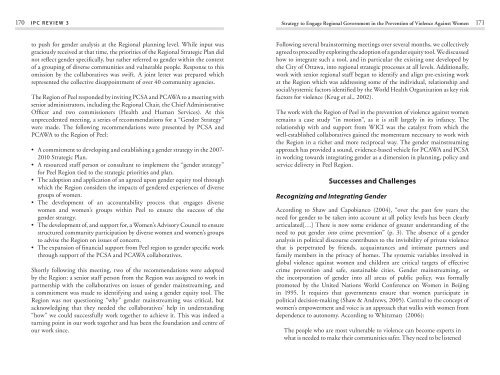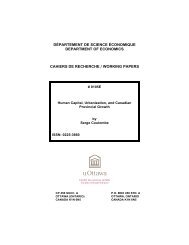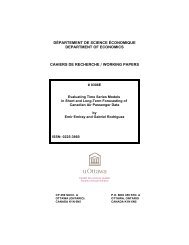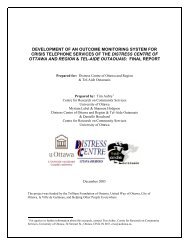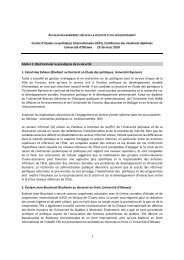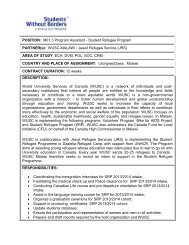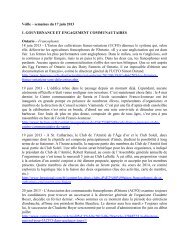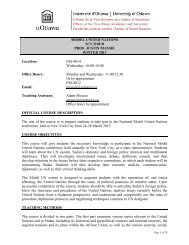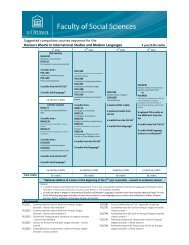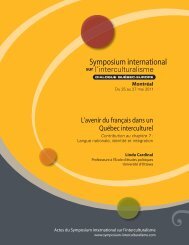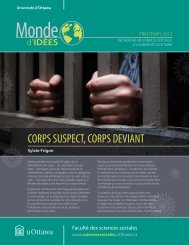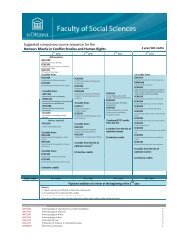Full text - Faculty of Social Sciences - Université d'Ottawa
Full text - Faculty of Social Sciences - Université d'Ottawa
Full text - Faculty of Social Sciences - Université d'Ottawa
You also want an ePaper? Increase the reach of your titles
YUMPU automatically turns print PDFs into web optimized ePapers that Google loves.
170 IPC Review 3 Strategy to Engage Regional Government in the Prevention <strong>of</strong> Violence Against Women 171<br />
to push for gender analysis at the Regional planning level. While input was<br />
graciously received at that time, the priorities <strong>of</strong> the Regional Strategic Plan did<br />
not reflect gender specifically, but rather referred to gender within the con<strong>text</strong><br />
<strong>of</strong> a grouping <strong>of</strong> diverse communities and vulnerable people. Response to this<br />
omission by the collaboratives was swift. A joint letter was prepared which<br />
represented the collective disappointment <strong>of</strong> over 40 community agencies.<br />
The Region <strong>of</strong> Peel responded by inviting PCSA and PCAWA to a meeting with<br />
senior administrators, including the Regional Chair, the Chief Administrative<br />
Officer and two commissioners (Health and Human Services). At this<br />
unprecedented meeting, a series <strong>of</strong> recommendations for a “Gender Strategy”<br />
were made. The following recommendations were presented by PCSA and<br />
PCAWA to the Region <strong>of</strong> Peel:<br />
• A commitment to developing and establishing a gender strategy in the 2007-<br />
2010 Strategic Plan.<br />
• A resourced staff person or consultant to implement the “gender strategy”<br />
for Peel Region tied to the strategic priorities and plan.<br />
• The adoption and application <strong>of</strong> an agreed upon gender equity tool through<br />
which the Region considers the impacts <strong>of</strong> gendered experiences <strong>of</strong> diverse<br />
groups <strong>of</strong> women.<br />
• The development <strong>of</strong> an accountability process that engages diverse<br />
women and women’s groups within Peel to ensure the success <strong>of</strong> the<br />
gender strategy.<br />
• The development <strong>of</strong>, and support for, a Women’s Advisory Council to ensure<br />
structured community participation by diverse women and women’s groups<br />
to advise the Region on issues <strong>of</strong> concern.<br />
• The expansion <strong>of</strong> financial support from Peel region to gender specific work<br />
through support <strong>of</strong> the PCSA and PCAWA collaboratives.<br />
Shortly following this meeting, two <strong>of</strong> the recommendations were adopted<br />
by the Region: a senior staff person from the Region was assigned to work in<br />
partnership with the collaboratives on issues <strong>of</strong> gender mainstreaming, and<br />
a commitment was made to identifying and using a gender equity tool. The<br />
Region was not questioning “why” gender mainstreaming was critical, but<br />
acknowledging that they needed the collaboratives’ help in understanding<br />
“how” we could successfully work together to achieve it. This was indeed a<br />
turning point in our work together and has been the foundation and centre <strong>of</strong><br />
our work since.<br />
Following several brainstorming meetings over several months, we collectively<br />
agreed to proceed by exploring the adoption <strong>of</strong> a gender equity tool. We discussed<br />
how to integrate such a tool, and in particular the existing one developed by<br />
the City <strong>of</strong> Ottawa, into regional strategic processes at all levels. Additionally,<br />
work with senior regional staff began to identify and align pre-existing work<br />
at the Region which was addressing some <strong>of</strong> the individual, relationship and<br />
social/systemic factors identified by the World Health Organization as key risk<br />
factors for violence (Krug et al., 2002).<br />
The work with the Region <strong>of</strong> Peel in the prevention <strong>of</strong> violence against women<br />
remains a case study “in motion”, as it is still largely in its infancy. The<br />
relationship with and support from WICI was the catalyst from which the<br />
well-established collaboratives gained the momentum necessary to work with<br />
the Region in a richer and more reciprocal way. The gender mainstreaming<br />
approach has provided a sound, evidence-based vehicle for PCAWA and PCSA<br />
in working towards integrating gender as a dimension in planning, policy and<br />
service delivery in Peel Region.<br />
Successes and Challenges<br />
Recognizing and Integrating Gender<br />
According to Shaw and Capobianco (2004), “over the past few years the<br />
need for gender to be taken into account at all policy levels has been clearly<br />
articulated[…] There is now some evidence <strong>of</strong> greater understanding <strong>of</strong> the<br />
need to put gender into crime prevention” (p. 3). The absence <strong>of</strong> a gender<br />
analysis in political discourse contributes to the invisibility <strong>of</strong> private violence<br />
that is perpetrated by friends, acquaintances and intimate partners and<br />
family members in the privacy <strong>of</strong> homes. The systemic variables involved in<br />
global violence against women and children are critical targets <strong>of</strong> effective<br />
crime prevention and safe, sustainable cities. Gender mainstreaming, or<br />
the incorporation <strong>of</strong> gender into all areas <strong>of</strong> public policy, was formally<br />
promoted by the United Nations World Conference on Women in Beijing<br />
in 1995. It requires that governments ensure that women participate in<br />
political decision-making (Shaw & Andrews, 2005). Central to the concept <strong>of</strong><br />
women’s empowerment and voice is an approach that walks with women from<br />
dependence to autonomy. According to Whitzman (2006):<br />
The people who are most vulnerable to violence can become experts in<br />
what is needed to make their communities safer. They need to be listened


